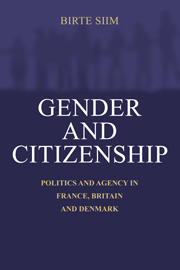Book contents
- Frontmatter
- Contents
- List of Tables and Figures
- Preface
- Abbreviations
- Introduction: Feminist Rethinking of Citizenship
- 1 Towards a Gender-sensitive Framework of Citizenship
- 2 Theories about Citizenship
- 3 Feminist Approaches to Citizenship
- 4 Gender and Citizenship: The French Case
- 5 Gender and Citizenship: The British Case
- 6 Gender and Citizenship: The Danish Case
- Conclusion: Towards a Contextualised Feminist Theory of Citizenship
- Appendix
- Notes
- Bibliography
- Index
4 - Gender and Citizenship: The French Case
Published online by Cambridge University Press: 05 November 2011
- Frontmatter
- Contents
- List of Tables and Figures
- Preface
- Abbreviations
- Introduction: Feminist Rethinking of Citizenship
- 1 Towards a Gender-sensitive Framework of Citizenship
- 2 Theories about Citizenship
- 3 Feminist Approaches to Citizenship
- 4 Gender and Citizenship: The French Case
- 5 Gender and Citizenship: The British Case
- 6 Gender and Citizenship: The Danish Case
- Conclusion: Towards a Contextualised Feminist Theory of Citizenship
- Appendix
- Notes
- Bibliography
- Index
Summary
Assumptions about Gender in the Republican Discourse
In this chapter I analyse the logic of the exclusion and inclusion of women in citizenship in France and discuss the key element in the French discourses about citizenship and the implications for women's political, civil and social rights. My objective is to illuminate the republican discourse about women's democratic and social rights in crucial periods of the formation of the welfare state and democracy. The focus is on the shifts in the discourses and politics of gender and citizenship and on the changing role of women's agency. The research interest is to understand the political meaning of gender in contemporary debates about citizenship.
The French political scientist Pierre Rosanvallon (1992: 16) has noticed that Marshall's model of citizenship does not apply in the case of Germany, where the welfare state was developed before universal suffrage, and even less to France, where the three aspects of citizenship coalesced during the Revolution of 1789. Rosanvallon has criticised. Marshall's model of citizenship for being too narrowly linked to the institutional development of political ideas and therefore tending to underestimate the uneven development between institutions and ideas. Democratic citizenship is one of the key elements in the political culture and political history of France (Rosanvallon 1992; Touraine 1994), and in contrast to social liberalism there is no tradition for analysing social rights as part of the theoretical framework of citizenship (Rosanvallon 1995).
- Type
- Chapter
- Information
- Gender and CitizenshipPolitics and Agency in France, Britain and Denmark, pp. 44 - 78Publisher: Cambridge University PressPrint publication year: 2000

